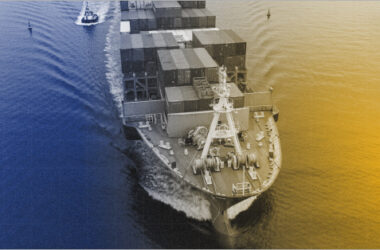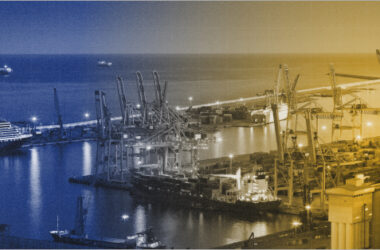Marine Insurance is a type of insurance that covers losses or damages incurred by ships, cargo, terminals, and any transport or property by water. It is an essential component of the maritime industry, providing protection to vessels and their cargoes against the risks of the sea. In India, Marine Insurance has been around for centuries, and it has played a crucial role in the country’s economic development.
The scope of Marine Insurance in India is vast and covers a range of risks and perils. The Indian Marine Insurance market is highly competitive, with both public and private players offering a wide range of insurance products. These products include hull insurance, cargo insurance, marine liability insurance, and marine reinsurance, among others. The scope of Marine Insurance in India also extends to inland water transport, offshore energy, and marine-related businesses such as shipbuilding and repair.
The Indian government has also taken several initiatives to promote the growth of the Marine Insurance industry. For instance, the government has allowed foreign reinsurers to set up branches in India, which has led to increased competition and improved the quality of insurance products. Additionally, the government has also introduced several reforms to streamline the claims settlement process, making it easier for policyholders to file claims and receive compensation. Overall, the scope of Marine Insurance in India is vast, and the industry is poised for significant growth in the coming years.
Historical Context of Marine Insurance in India
Marine Insurance in India has a long history that dates to the 17th century when the British East India Company established its presence in India. The company was the first to offer Marine Insurance to its ships and cargo, and this practice soon spread to other European trading companies.
During the colonial period, Marine Insurance in India was dominated by British insurance companies. These companies offered insurance to Indian shipowners and traders, but the premiums were high, and the coverage was limited. As a result, many Indian shipowners and traders relied on informal insurance arrangements, such as mutual insurance societies, to protect their assets.
After India gained independence in 1947, the government took steps to promote the growth of the domestic insurance industry, including Marine Cargo Insurance. The government established the Life Insurance Corporation of India (LIC) in 1956 to regulate the life insurance industry, and the General Insurance Corporation of India (GIC) in 1972 to regulate the non-life insurance industry, including Marine Insurance.
Today, Marine Cargo Insurance in India is a thriving industry, with both domestic and international players offering a range of insurance products to shipowners, cargo owners, and other stakeholders in the maritime industry. The scope of Marine Insurance in India has expanded beyond traditional hull and cargo insurance to include a range of specialized products, such as liability insurance, marine war risk insurance, and cyber insurance.
In recent years, the Indian government has taken steps to promote the growth of the maritime industry, including the development of new ports and the modernization of existing ones. This has created new opportunities for the Marine Insurance industry in India, and many companies are now looking to expand their operations in the country.
Types of Marine Insurance Policies
Marine Cargo Insurance Policies are designed to protect the interests of ship owners, cargo owners, and other parties involved in maritime trade. There are different types of Marine Insurance Policies available in India, each covering specific risks.
Hull Insurance
Hull insurance is a type of Marine Insurance that covers physical damage to the ship, including its machinery and equipment. This policy typically covers risks such as collision, grounding, fire, and theft. Hull insurance is essential for ship owners as it helps them to recover the cost of repairs or replacement of the ship in case of any damage.
Cargo Insurance
Cargo insurance is a type of Marine Insurance that covers the loss or damage of goods transported by sea. This policy covers risks such as theft, damage due to mishandling, and loss due to natural disasters. Cargo insurance is essential for cargo owners as it helps them to recover the cost of the lost or damaged goods.
Freight Insurance
Freight insurance is a type of Marine Insurance that covers the loss of freight revenue due to the loss or damage of goods during transportation. This policy covers risks such as delay, loss, or damage of goods. Freight insurance is essential for freight forwarders and shipping companies as it helps them to recover the revenue lost due to the loss or damage of goods.
Liability Insurance
Liability insurance is a type of Marine Insurance that covers the legal liability of ship owners and other parties involved in maritime trade. This policy covers risks such as collision, pollution, and injury or death of crew members. Liability insurance is essential for ship owners and other parties involved in maritime trade as it helps them to cover the legal costs and compensation in case of any liability.
In summary, Marine Insurance Policies are essential for all parties involved in maritime trade. By choosing the right type of Marine Insurance Policy, ship owners, cargo owners, freight forwarders, and shipping companies can protect their interests and avoid financial losses.
Key Principles Governing Marine Insurance
Marine insurance provides coverage for ships, cargo, and other marine-related risks. In India, Marine Cargo Insurance is governed by several key principles that ensure transparency and fairness in the insurance process.
1. Utmost Good Faith
The principle of utmost good faith requires both the insurer and the insured to disclose all relevant information pertaining to the Marine Cargo Insurance Policy. This includes information about the vessel, its condition and the nature of the cargo being transported. Failure to disclose such information can result in the policy being declared void.
2. Insurable Interest
The principle of insurable interest requires the insured to have a financial interest in the vessel or cargo being insured. This ensures that the insured has a genuine interest in the safe arrival of the vessel and the cargo.
3. Indemnity
The principle of indemnity ensures that the insured is compensated for the actual loss suffered due to damage or loss of the vessel or cargo. The insurer is only liable to compensate the insured up to the value of the insured interest.
4. Contribution
The principle of contribution requires all insurers who have provided coverage for the same vessel or cargo to contribute to the loss in proportion to their respective policies. This ensures that the insured is not overcompensated for the loss suffered.
5. Subrogation
The principle of subrogation allows the insurer to take legal action against a third party responsible for causing the loss. This ensures that the insurer can recover the amount paid to the insured for the loss suffered.
In conclusion, these key principles ensure that Marine Cargo Insurance in India operates in a fair and transparent manner. Insured parties can be confident that they will be compensated for actual losses suffered, while insurers can operate with the knowledge that they are protected from fraudulent claims.
Coverage Aspects of Marine Insurance
Marine Cargo Insurance covers a wide range of risks associated with the transportation of goods and passengers by sea. The coverage aspects of Marine Cargo Insurance in India can be broadly classified into three categories: perils of the sea, war and strikes risks, and protection and indemnity (P&I).
Perils of the Sea
Perils of the Sea refer to the natural hazards that can cause damage or loss to the ship or cargo, such as storms, lightning, collision, grounding, and sinking. Marine Cargo Insurance Policies typically cover these risks, and the extent of coverage depends on the type of policy purchased.
War and Strikes Risks
War and Strikes Risks cover damage or loss caused by acts of war, piracy, terrorism, or strikes. These risks are not covered by standard Marine Insurance policies and must be specifically added to the policy as an endorsement. The coverage for such risks is usually subject to certain limitations and exclusions.
Protection and Indemnity (P&I)
Protection and indemnity (P&I) insurance covers liability for loss or damage to third-party property or persons. This includes damage to other ships, cargo, or port facilities, as well as injury or death to crew members or passengers. P&I insurance is usually purchased by ship owners or operators and is not a mandatory requirement in India.
In conclusion, Marine Insurance plays a vital role in protecting the interests of ship owners, cargo owners, and other stakeholders involved in the transportation of goods and passengers by sea. The coverage aspects of Marine Insurance in India are comprehensive and cover a wide range of risks associated with marine transportation.
Claims and Settlement in Marine Insurance
Marine Cargo Insurance claims can arise due to various reasons such as loss or damage to the cargo, liability claims, and hull damage. The Marine Cargo Insurance Policy covers all these aspects and provides financial protection to the policyholder.
When a claim is made, the insured must inform the insurer immediately and provide all the necessary details such as the type of loss or damage, the value of the cargo, and the cause of the loss. The insurer will then appoint a surveyor to assess the extent of the damage and the loss incurred.
Once the surveyor submits his report, the insurer will assess the claim and determine the amount payable. If the claim is accepted, the insurer will settle the claim by paying the insured the agreed amount. However, if the claim is rejected, the insurer will provide reasons for the rejection.
In the case of liability claims, the insurer will investigate the claim and determine the extent of the liability. If the claim is accepted, the insurer will settle the claim by paying the claimant the agreed amount. However, if the claim is rejected, the insurer will provide reasons for the rejection.
It is important to note that the insured must provide accurate and complete information when making a claim. Failure to do so may result in the claim being rejected. It is also important to notify the insurer immediately in case of a loss or damage to the cargo.
In conclusion, Marine Cargo Insurance claims and settlement procedures are crucial aspects of the Marine Cargo Insurance Policy. The insured must provide accurate information and notify the insurer immediately in case of a loss or damage. The insurer will then investigate the claim and settle the claim if it is accepted.
Regulatory Framework for Marine Insurance in India
Marine Cargo Insurance in India is regulated by the Marine Insurance Act, 1963, which provides the legal framework for Marine Insurance in the country. The act defines the scope of Marine Insurance and lays down the rights and obligations of the insurer and the insured.
Marine Insurance Act
The Marine Insurance Act, 1963, provides for the regulation of Marine Cargo Insurance in India. The act defines Marine Insurance as the insurance of any subject matter that is exposed to maritime perils. The act also defines what constitutes a marine peril, which includes loss or damage caused by fire, collision, jettison, piracy, and other similar risks.
The act also lays down the rights and obligations of the insurer and the insured. It specifies the duties of the insurer, including the duty to provide insurance cover, the duty to pay compensation in case of loss, and the duty to investigate claims. The act also specifies the duties of the insured, including the duty to disclose all material facts related to the subject matter of insurance.
Role of IRDAI
The Insurance Regulatory and Development Authority of India (IRDAI) is the regulatory body that oversees the functioning of the insurance sector in India. The IRDAI has the power to issue guidelines and regulations for the conduct of Marine Cargo Insurance business in India.
The IRDAI has issued guidelines for the conduct of Marine Cargo Insurance business in India, which specify the minimum standards that insurers must comply with. The guidelines cover areas such as underwriting, claims settlement, and risk management.
In conclusion, the regulatory framework for Marine Insurance in India is well defined. The Marine Insurance Act, 1963, provides the legal framework for Marine Insurance in the country, while the IRDAI oversees the functioning of the insurance sector and issues guidelines for the conduct of Marine Insurance business. Insurers must comply with these guidelines to ensure that they provide quality insurance cover to their clients.
Challenges and Future of Marine Insurance in India
Marine Insurance in India faces several challenges that pose a threat to its growth and development. One of the major challenges is the lack of awareness among the public about the importance of Marine Insurance. This is particularly true for small and medium-sized enterprises (SMEs) that are engaged in international trade and are exposed to various risks associated with it.
Another challenge is the lack of adequate infrastructure and technology to support the growth of the Marine Insurance industry in India. This includes the lack of modern ports, shipping lanes, and other related infrastructure that can facilitate the growth of the industry.
The regulatory framework governing the Marine Insurance industry in India is also a challenge. The industry is governed by several different regulations, which can be complex and confusing for insurers and policyholders. This can lead to delays in claims processing and other related issues that can affect the overall efficiency of the industry.
Despite these challenges, the future of Marine Insurance in India is promising. The government has recognized the importance of the industry and has taken steps to promote its growth. For example, the government has allowed 100% foreign direct investment (FDI) in the insurance sector, which has opened new opportunities for foreign insurers to enter the Indian market.
In addition, the government has also launched several initiatives to promote the growth of the marine industry, such as the Sagarmala project which aims to develop India’s ports and shipping infrastructure. These initiatives are expected to provide a boost to the Marine Insurance industry as well.
Overall, while there are challenges facing the Marine Insurance industry in India, the future looks promising. With the right infrastructure, technology, and regulatory framework in place, the industry has the potential to grow and become a key player in the global Marine Insurance market.







